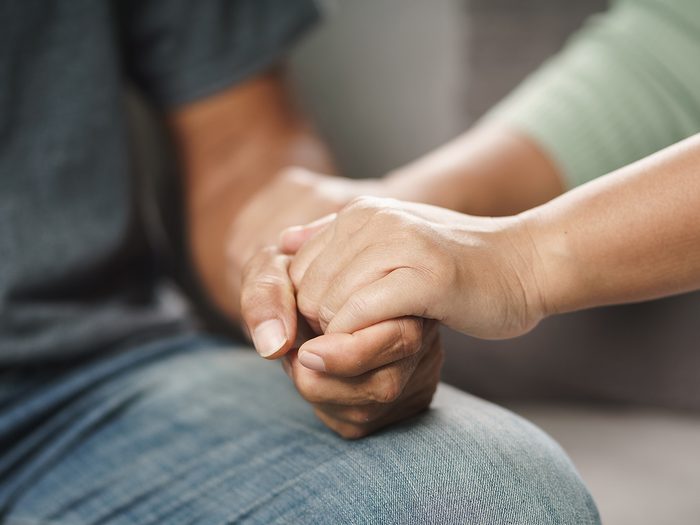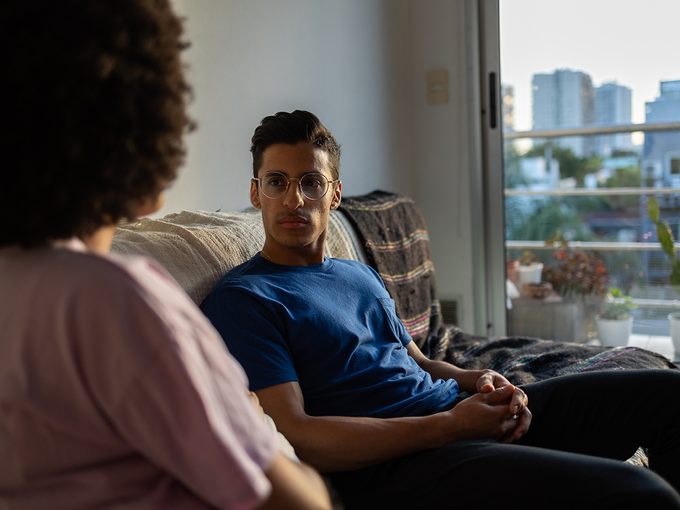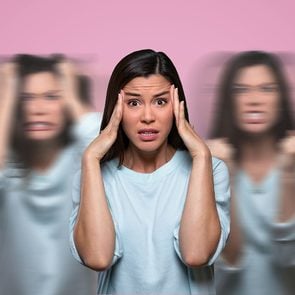How to Help Someone Who’s Struggling With Depression

One in four Canadians will experience depression at some point in their life, but many of us don't know what to do when someone we love needs help. Here's where to start.
Shortly after their honeymoon in 2001, Christian Bouvet felt something was amiss with his wife, Myreille. When the pair had been back at their home in Montreal for a couple months, Myreille, who works as an artist and in communications, had become distant and more emotional than usual. She cried often; once, Christian came home to her curled up and cowering in the corner of their apartment.
“I couldn’t understand why she felt bad when there was no obvious cause for it and our life was going so nicely,” the 52-year-old remembers. Knowing little about mental health challenges, he tried to remain calm and assured by his wife’s side, but he felt at a loss for how to help her. “I had hoped she would get through it herself,” he says.
A psychiatrist eventually prescribed some medication for Myreille, which was intended to improve the then-44-year-old’s condition within weeks. But three months passed, and her depression worsened. She began losing hope that she could feel better. Bouvet says she stopped going out, opting instead to sit alone at home. Eventually she was hospitalized. Bouvet struggled to stay positive and was unsure how to navigate the situation.
Given that about one in four Canadians will suffer depression serious enough to need treatment during their lifetime, a large number of us will at some point be in a position to offer support. Here are some tips on how to help someone who is depressed.
How to Help Someone Who is Depressed
Learn to spot the signs of depression
Depression is so ubiquitous, says Toronto professor of clinical psychology Robert T. Muller, that it’s sometimes referred to by professionals in his field as “the common cold of mental illnesses.” Despite this fact, it’s not always recognized by sufferers or their family and friends.
Part of the difficulty is the multifaceted nature of the condition. “It’s a diagnosis that has so many causes,” Muller says. “And it shows differently in everyone.”
In fact, signs of depression can manifest from four areas of an individual’s health: behavioural (self-isolation and avoidance), physical (body aches and headaches), cognitive (feelings of failure or guilt, and suicidal thoughts) and emotional (sadness and anxiety).
Muller recommends keeping an eye on changes in a loved one’s demeanour. They may be depressed if they’re usually outdoorsy and extroverted but start spending more time cooped up at home, and rarely return calls or texts. Muller suggests approaching initial conversations by telling the depressed person that you care about them and have noticed changes in their moods and behaviours. An open and honest dialogue, he says, is often the first step toward treatment.

Start with compassion
According to Bart Campbell, an educator for mental health and wellness at the Mood Disorders Association of Ontario, people suffering from depression often feel their condition isn’t taken seriously. Some might think, for instance, that their loved one just needs to get out of bed to feel better.
Instead, Campbell says, it can help to reinforce that you understand depression is an illness and not something they can choose to overcome. “You wouldn’t tell someone with a broken leg to just get up,” he says.
When attempting to provide ongoing support, Campbell recommends beginning with open-ended questions: what are you feeling today? In what ways can I help you right now?
And even if you have been through depression, it’s best not to make any assumptions. “When we personalize the disorder—when we assume we know what they’re going through based on our own experiences—we lose the opportunity to learn their experience.”
Anna Mehler Paperny, whose struggles with depression are described in her memoir, Hello I Want to Die Please Fix Me, says the best support can sometimes be practical: calling in the morning to make sure they’re awake for work, going on a half-hour walk with them every day or picking up some groceries for them. “If you’re noticing someone having trouble with basic aspects of life,” she says, “offering help in a natural way can feel life-changing.”
Here’s expert advice on how to be a more compassionate person.
Take care of yourself
The stress of caring for someone with depression can take a toll on your own health—and depressed people sometimes act out and become angry with their caregivers. That’s why Campbell says it’s important to take time to set boundaries and seek your own support.
The Mood Disorders Society of Canada and the Canadian Mental Health Association offer recovery groups across Canada, where sufferers and their relatives can work together. In these groups, those with depression and their support network are educated about how to manage a mood disorder and build plans to cope with the illness in the future.
If caregivers can’t make it to a support group, Campbell recommends making time for pleasant activities that bring relief from the emotional labour. “You can’t always be on,” Campbell says. “It’s important to take time to refuel.” (Don’t miss these self care tips for caregivers.)
Mehler Paperny knows first-hand that it can be difficult to be around someone with depression, and sometimes space is necessary. But she says help can come in small ways—a short phone call or even sending a text message to check in can make a difference. “Being a presence in a depressed person’s life can help them feel loved and wanted,” she says.
Muller adds that it’s most important that you avoid becoming a stand-in psychologist. While it’s crucial to listen and express affection, he advises that trying to mimic therapy without actually having training often ends in frustration. Instead, encourage your loved one to see a professional, and do so regularly.
With her doctor’s help, Myreille recovered from her post-honeymoon depression, which, it turns out, was caused by a severe chemical imbalance. Then, a year and a half ago, she relapsed after nearly 15 years of managing her depression. Bouvet found comfort in the knowledge he’d gained of how to navigate his wife’s depression in the medical system. And this time, he also surrounded himself with friends and family for his own support. “You have to know that you can’t get through it alone,” he says.
Now that you’re familiar with these tips on how to help someone who is depressed, check out 10 mental health podcasts worth adding to your playlist.






